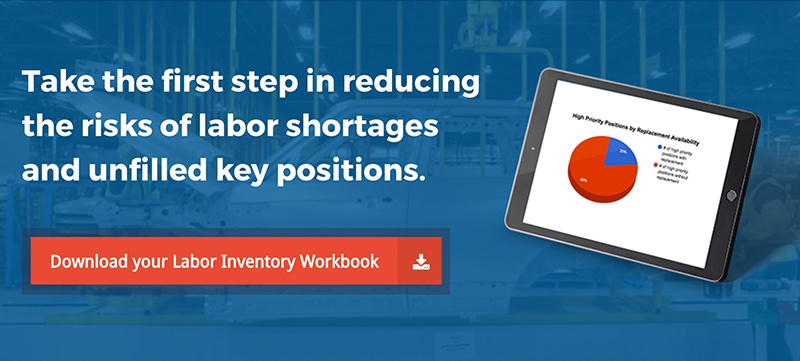Ensuring there is a sufficient amount of skilled labor for your business operations is critical for success in today's economy. Businesses should have contingency plans for labor shortages that could impact their operations, just as they should be prepared for man-made and natural disasters.
One popular solution when such a situation arises is to employ temporary labor through local staffing agencies. Currently, there are a total of 2.9 million temporary employees in the United States. This represents roughly two percent of total employment and signifies that a diverse range of companies have needs for filling vacancies quickly.
Even so, about 35 percent of businesses still experience a shortage of skilled labor according to the National Association for Business Economics. For industries that often require temporary help especially with hard-to-fill roles, it's even more crucial to business continuity that they have other specialized staffing tools to access and deploy skilled short-term workers.
Discussed here are those industries that can benefit the greatest from skilled workers.
Transportation
Based off a study by the American Transport Research Institute (ATRI), 80 percent of motor carriers are currently experiencing a decline in productivity. This is being caused by new rules on driving hours, poor scheduling (possibly due to the inconsistent nature of the business) and the high cost of operations and maintenance.
In the trucking field, which has a rapidly aging workforce, it is expected that there will be nearly 900,000 job openings in trucking through 2025. However, even by 2022, there will be roughly 240,000 unfilled positions.
These are the reasons why the transportation sector is one of the highest employers of temporary workers. Logistics companies simply need CDL-A drivers, diesel mechanics, fleet maintenance pros and other specialists in the industry.
Carriers not only call on short-term employees because there is a shortage, but also because, due to the ebbs and flows of the industry, temporary employment makes sense. In a field with already thin margins, employing skilled temporary labor is financially wise as well.
Production and Manufacturing
Production and manufacturing jobs account for 24 percent of all temporary jobs in the United States. This is a significant portion, and it highlights a need for material handlers, PLC programmers, injection mold operators, welders and other trained workers.
The manufacturing sector has to employ so many temporary workers because of a large skills gap in the industry. There is expected to be two million unfilled jobs in production by 2025. There are simply not enough forklift operators, machinists, tool and die makers, CNC programmers and other skilled laborers available.
When a full-time employee can't be found, going to a temp agency is the next best thing. However, because many traditional temp agencies focus on the local area to secure talent, and should there be a local or regional labor shortage, they may not be the right tool. This is where a contingency staffing agency, one that sources talent nationwide, can help. The best are able to quickly and reliably provide access to experienced skilled trades personnel no matter the location.
Manufacturers clearly value the skilled labor they use because an average of five percent of manufacturing payroll is spent on short-term help. Such help enables production plants to accomplish the following:
- fill surprise big orders
- overcome a pressing supply chain issue
- solve critical labor gaps during a busy season
- deal with an unexpected event, like a natural disaster
Construction
The construction industry has long been a sector where seasonal employment is popular. Even with full-time construction employment rising, and some cities undergoing a construction boom, the construction sector is still one of the highest employers of skilled temp labor.
There are nearly 200,000 unfilled construction jobs as of 2016. So, this is why many construction companies choose to go to a staffing agency for heavy equipment operators, pipefitters, crane operators, industrial electricians and other skilled workers. It helps fill a short-term need for those positions without a long-term commitment (which is difficult to make in such a hot and cold field).
It's also partially the nature of the industry that makes temp work so common. Construction jobs have a definite start and finish, and many companies choose to bring on added help temporarily for a big project. Once that project is finished, there may be no need to continue employing some of those workers.
Also, because the work is demanding and sometimes dangerous, it's even more essential that companies choose the right staffing agency. To mitigate risks when hiring temps, construction firms could look for staffing agencies that offer additional services, like background investigations, drug tests, reference checks and/or on-site management.
Repair and Maintenance
The repair and maintenance industry encompasses a broad spectrum of companies. All sorts of skilled workers find temporary gigs in this field, including HVAC technicians, painters, auto mechanics and facility maintenance experts.
Many of the skilled laborers working in this field do so independently or through a staffing firm. This allows them the flexibility they need to diversify income sources and charge a suitable rate. It also allows companies the flexibility to only use their services when needed.
It's not just the desire for flexibility that makes the repair and maintenance industry so popular for temp work. It's also the shortage of workers.
For instance, there is a shortage of aviation maintenance technicians. Boeing predicts there will be 600,000 jobs in the field by 2031, but clearly, not enough techs to fill the need. This means skilled technicians, who can shuffle from carrier to carrier doing work as needed, will be highly used.
Choosing Temporary Workers for Your Company
You want to do your research and partner with a reputable contingency staffing agency. However, with more than 20,000 staffing agencies in America, that may seem difficult.
Thankfully, there is a way to ensure you get all the advantages of skilled short-term labor. Different agencies have different core competencies, so it makes sense to assess the agency before hiring to determine if they can meet your needs. It also makes sense to understand the cost benefits of filled versus unfilled positions. This way, you can properly evaluate the type of solution needed.
Once you've brought on temp workers, manage them like you would full-time employees. Consistently analyze their performance and the impact on your company's success.








Comments
Currently, there are no comments. Be the first to post one!